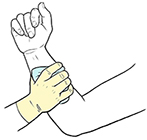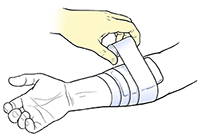First Aid: Cuts and Scrapes
A break in the skin is an open door, inviting dirt and germs to enter your body and cause infection.
Step 1. Control bleeding

Step 2. Clean and cover
-
Wash the scrape or cut with soap and water to kill germs and remove dirt and foreign objects.
-
Apply a topical antibiotic to minor cuts and scrapes that don't need medical attention (see below).
-
Cover the wound with a clean gauze dressing to reduce the risk of infection and further injury. Keep the dressing in place with a gauze or cloth bandage.
-
Don't tie or tape the bandage too tight.

When to call the healthcare provider
Call the healthcare provider or get medical care right away if any of the following is true:
-
The wound covers a large area or is deep.
-
The injury is on the face or any other area where scarring is a concern.
-
The person needs protection against tetanus. This is a disease caused by bacteria that may enter any break in the skin and bring on a life-threatening illness called lockjaw. A tetanus booster shot (injection) may be needed if it's been more than 5 years since the last tetanus vaccine.
Call 911
Call 911 if the injured person has any of the following:
Online Medical Reviewer:
Eric Perez MD
Online Medical Reviewer:
Paula Goode RN BSN MSN
Online Medical Reviewer:
Tara Novick BSN MSN
Date Last Reviewed:
3/1/2022
© 2000-2025 The StayWell Company, LLC. All rights reserved. This information is not intended as a substitute for professional medical care. Always follow your healthcare professional's instructions.